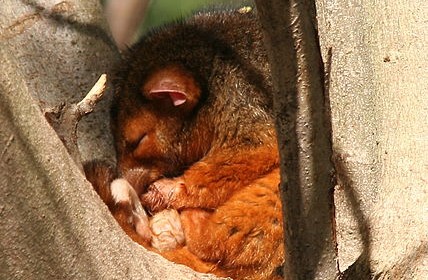Ringtail Possum and tree decline Western Port News, December 1

Eucalyptus trees (in particular Eucalyptus radiata & Eucalytus ovata) across the Mornington Peninsula and beyond are undergoing decline, and Ringtail possums are to blame, according to Dr Jeff Yugovic. The “overbrowsing” of the possums is being declared the reason for the trees’ demise, with little scientific data and other alternative causes have barely considered.
Our indigenous native herbivores are easy prey when it comes to being accused of causing environmental flora destruction, and as “pests”. Kangaroos are blamed for “over-grazing”, koalas are accused of over-populating, and possums are accused of any demise of native trees – because they eat them!
Yugovic says that, “Without predators, entire tree canopies can be lost to folivores such as monkeys and possums and whole areas can be denuded by grazers such as goats or rabbits. Also, without top predators the mid-size mesopredators such as raccoons or foxes are more abundant and take more small fauna than before”. 1
Wonder what evidence there is of these mid-sized mesopredators in the Mornington Peninsula? There is evidence of a sustainable number of Powerful Owls and a full compliment of avian predators, snakes, roads and introduced species such as cats (domestic, feral & stray) and dogs.
Other forms of tree mortalities are considered, and dismissed, as being “minor”. Dense scrubby undergrowth is allowing possums to hide from their predators, foxes. Yugovic says that major predators of the Ringtail possum are locally extinct, so there is an “overpopulation” of the former.
(image: Mornington Peninsula showing heavy urbanisation. Nick Carson)
Environmental Care, Mt Eliza, agrees that the Ringtail possum is the problem. However, wildlife experts such as Mal Legg, Hans Brunner and Craig Thomson disagree. Their concerns are dismissed as they “don’t live in the area”! However all three live, work and volunteer on the Mornington Peninsula. Besides ecologists and naturalist don’t have to live in the areas they study.
Ecologist Hans Brunner has already written a response in Candobetter.net. He says that “the expectation that an increase of predators may reduce a few possums would surely be badly out-weighed by the risk of losing proportionally even more of our rare, native wildlife species”.
While researchers found few brushtail possums in bushland reserves, Dr Yugovic said brushtails browse significantly on trees in gardens where they are near buildings with shelter.
“Brushtails eat adult leaves which thins the foliage throughout trees, while ringtails are more damaging by being smaller and able to reach their preferred shoots and young leaves at the end of branches,” Dr Yugovic said.2
The simple answer, according to Yugovic, is to thin the understorey, and the trees will recover! Possum numbers will thus decline, as the possums will need to come to ground, where the foxes will predate on them. Possums might be at the scene of the crime, but not necessarily the criminals.
Foxes are everywhere and partly replace the dingo as predator? What evidence is there that dingoes and foxes provide the same ecological function on the Peninsula? It would be a fair comment to say dingoes are an apex predator, while foxes are a more opportunistic predator.
There are other possible and likely alternative reasons for the dying of the trees.
- -spraying herbicides, such as metsulfuron, that is a broad leaf herbicide that adds salt to soils. This can persist in the soil for up to 18 months
- -soil pathogens like cinnamon fungus that have previously tested positive on sites in question
- -overload of weeds that poison the soil and reduce natural regeneration
- -highly urbanised environment, Removal of vegetation for sub-divisions and house extensions. Impacting on the hydrology and fragmentation of vegetation. This means roads, power-lines, cars, emissions and the edge-effect
- -climate change and drought, with heat stress predicted to be a major cause of native species’ deaths.
The study, written in 2014 by Ecology Australia, commissioned by the Mornington Peninsula Shire, was meant to rectify the problem. There seems to be little examination of other alternative causes, or refined research, to reach the conclusion to the guilty verdict for Ringtail possums.
Ecology Australia provides services for environmental management, ecological services, and planning and approvals! They sound ominously like their focus is on corporate services, management of native vegetation and species to fit human activities, rather than conservation, wildlife rescue or holistic, custodianship of our unique natural heritage – and concern for the welfare of native animals.
2.Fox seen as answer to possum problem
Australian Wildlife Protection Council, committee
Ross house, level 3
247 Flinders Lane, Melbourne 3000
(featured image: Common Ringtail possum, Brisbane 2007, by Glen Fergus)

